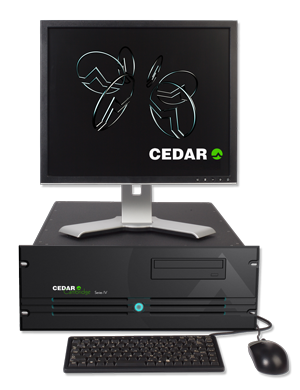So much more than audio restoration... CEDAR Cambridge V6

9 October 2009
Based on the latest CEDAR Cambridge Series III hardware, Version 6 is another step forward in audio signal processing, offering four new processes and a significant addition to the system's batch processing capabilities.
The Modules
Unlike most of CEDAR's processes, the modules added in Version 6 are not aimed specifically at audio restoration in the traditional sense, but at audio preparation for all manner of uses.
To illustrate this, imagine taking a dozen disparate recordings - such as a mixture of live and studio recordings - and trying to make them suitable for distribution as a coherent body of work. These may exhibit different levels, different peak/power ratios, different tonalities and so on... In short, they may all sound very different from one another.
Now imagine a suite of processes that allow you to match these characteristics in a single,automated procedure. Just select a track that exhibits the desired characteristics - you would like every track to be this loud, and sound just so with respect to dynamics, tone, and stereo soundstage - and CEDAR Cambridge will process your audio to create a set of files with these qualities, ready for compiling into their final form.
Reshape
Reshape is not just another version of what is commonly called a "matching equaliser" - i.e. one that imposes the tonal characteristics of one audio signal upon another. Unlike these, Reshape identifies the tonal and spatial characteristics of the template track and is able to impose these upon the audio that you are processing. The combined effect allows users to create tracks with desired EQ characteristics and a pleasing soundstage even if they have little or no experience of mastering audio.
Adaptive Limiter
Unlike a traditional limiter or a multi-band device, CEDAR's Adaptive Limiter employs a unique new algorithm that calculates a continuingly varying EQ profile that constrains the amplitude of the output while retaining the integrity of the input signal. The result is a signal that can simultaneously sound louder yet still be more natural than audio processed using conventional limiters and maximisers. Of course, you don't have to use it to make things sound loud. It's just a great limiter!
Peak & Power Normalisers
The final elements are provided by CEDAR's new Peak and Power Normalisers. Offering five standards of power calculation (power normaliser)and over-sampling (peak normaliser) these allow you to determine the output level with a very high accuracy.
Putting it all together
You can use all of the new processes in the conventional manner, streaming or rendering your audio as appropriate. However, to make full use of them, we have also introduced an upgraded batch processing mechanism that allows you to combine multiple render streams with the new track-based processes.
The key here is the Action List, which allows you to cascade the actions of streaming processes such as the Adaptive Limiter with track-based processes such as Reshape and the Normalisers, all configured exactly as you wish for any given job.
So, finally, imagine that you are working on a large network of mastering systems, ingestion systems or other workstations, and that you want to take advantage of the new CEDAR processes (or any of the others installed on your CEDAR Cambridge system). No problem... you can be sitting on the other side of the facility, but if you can see CEDAR's input folders, you can simply drag-and-drop your audio into one of these, whereupon it will be processed and then deposited in your chosen destination.
For further information:
CEDAR Audio Limited, 20 Home End, Fulbourn, Cambridge, CB21 5BS, United Kingdom.
t: +44 1223 881771
f: +44 1223 881778
e: info@cedaraudio.com